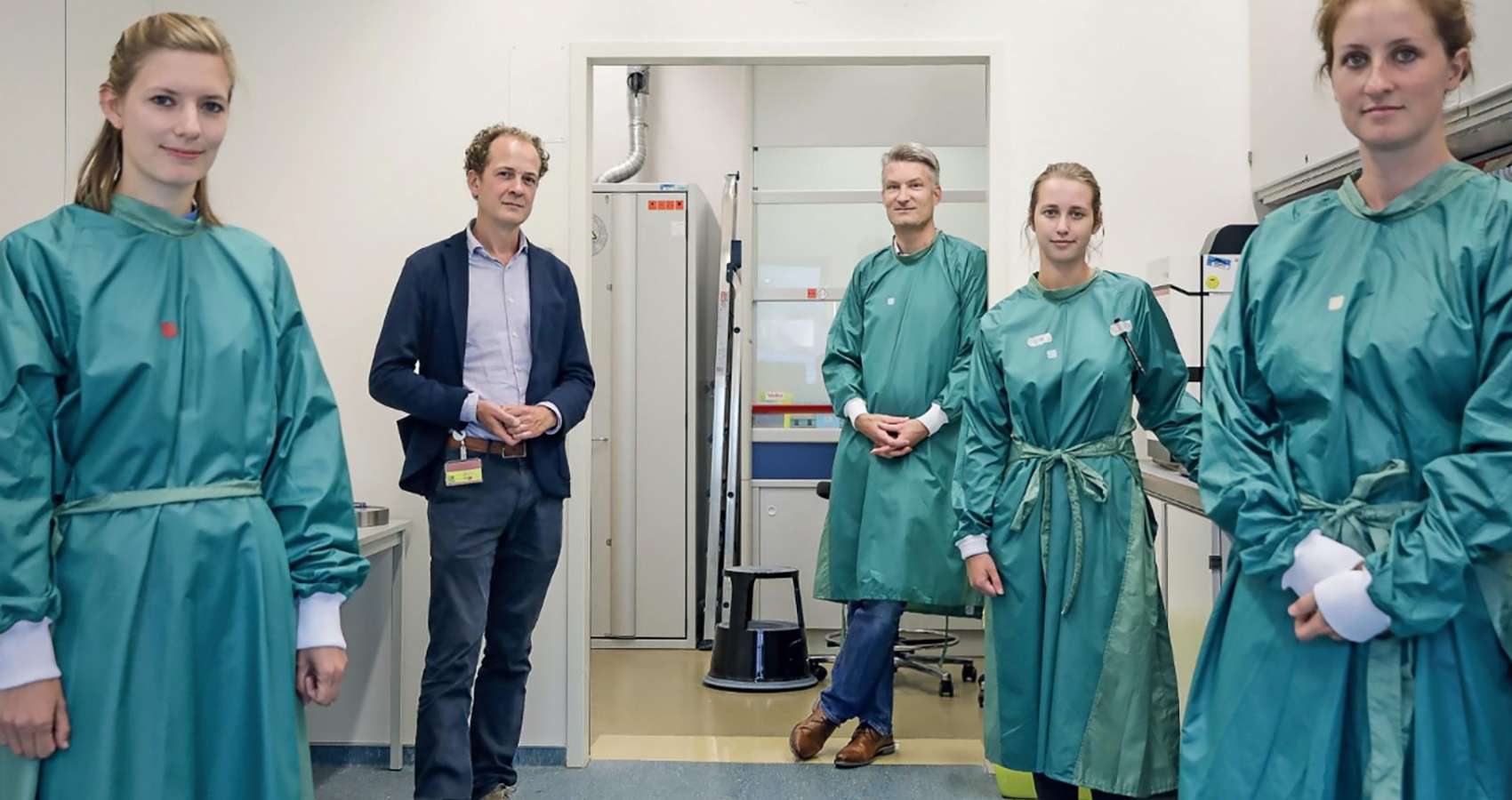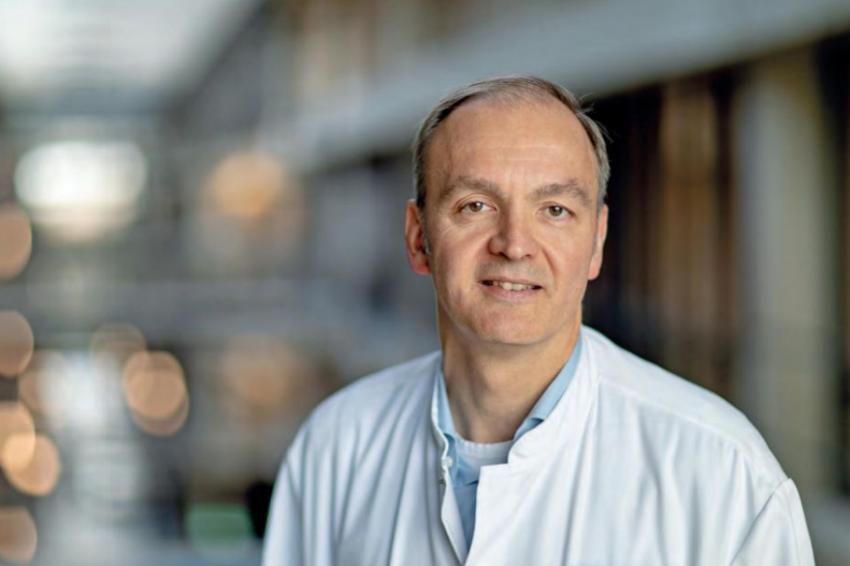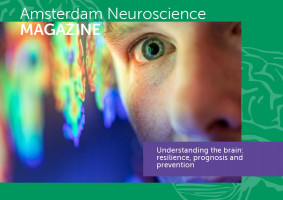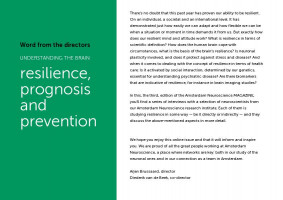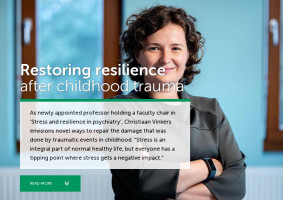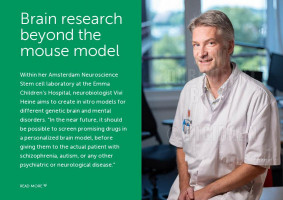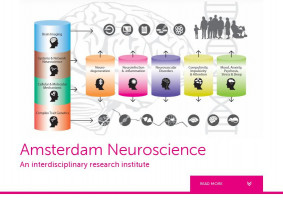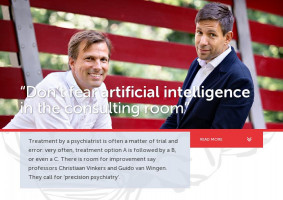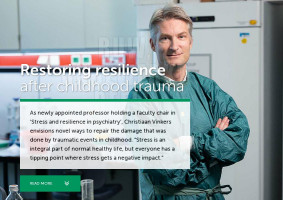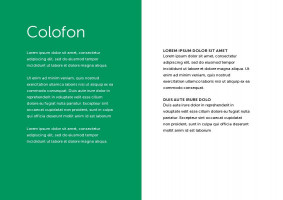“Ahet first glance, there is quite a big difference between psychiatry and the rest of medicine,” says Guido van Wingen, Professor of Neuroimaging in Psychiatry at Amsterdam UMC, location AMC. “Every doctor tries to objectify in the consulting room. Based on the symptoms a patient presents, they request lab tests or imaging techniques, after which a treatment is implemented that is as evidence-based as possible. Psychiatry often has a harder time for that matter. In fact, there isn’t much more to go on than the patient’s information. And that story is, by definition, subjective.”
Illusion of objectivity
Professor of Stress and Resilience in Psychiatry at Amsterdam UMC, location VUmc, Christiaan Vinkers[JG1] acknowledges this difference, although he also likes to emphasize that his fellow specialists in other fields often rely on what he calls ‘the illusion of objectivity’. “Of course, the level of evidence in other fields is also open to criticism, but it is true: while an oncologist has tumor markers or other blood values to hold onto, psychiatry has far fewer objective points of reference,” he says. “The well-known psychiatrist’s handbook, the Diagnostic and Statistical Manual of Mental Disorders (DSM[JG2] [DM(3] ), does offer classifications of disorders such as depression, but those classifications are very coarse at best. Depression is enormously heterogeneous in clinical practice; there is a wide range of triggers and manifestations. The problem can arise from childhood traumas, but it can arise from metabolic problems as well. Inflammation associated with obesity can also cause depression. So, in order to better help an individual patient in the future, there is a need to better understand where all this heterogeneity comes from.” [JG1]Same query as above - do we need location of where he is based (I think it UMC?) If so, this will be:Amsterdam UMC’s Professor of Stress and Resilience in Psychiatry, Christiaan Vinkers, acknowledges….OrProfessor of Stress and Resilience in Psychiatry at Amsterdam UMC, Christiaan Vinkers, acknowledges….Also: is professor ‘enough’ of a title as I know he was appointed ‘faculty chair’So does that need to be included somehow? [JG2]Do you want this written out in full (and if so, in italics)? Diagnostic and Statistical Manual of Mental Disorders [DM(3]Volgens mij geen italics toch?
Psychology and biology
Vinkers and his team also want to examine whether either a pharmacological treatment or a psychological therapy may improve the performance of the normal ‘stress orchestra’: the so-called RESET-trials, funded by the Hersenstichting and Stichting Tot Steun. “Mifepristone is a medicine that blocks the glucocorticoid receptor in the brain. In preclinical settings this has proven to be a potentially valuable treatment to help repair the consequences of childhood trauma at adult age. Now is the time to examine this drug in a robust clinical trial.” In another therapeutic approach, Vinkers and his team want to see if psychotherapy can reset the brain to a healthy way of dealing with childhood trauma. “EMDR and Imaginary Rescripting have become very strong instruments in modern psychiatry, for patients with mental problems caused by traumatic events. I firmly believe that the therapeutic value of literally rescripting your memory has been underestimated so far. In our RESET-trials, we want to compare either this psychological approach or the biological approach through glucocorticoid receptor-blockers, with the regular approach of modern-day psychological care in childhood trauma.”
New chair
Apart from being awarded a prestigious VIDI-grant, Vinkers was recently also appointed as faculty chair ‘Stress and Resilience in Psychiatry’ at Amsterdam UMC. “Rooted in the Departments of Psychiatry and of Anatomy & Neurosciences, this is an enormous honour”, Vinkers admits. “The brain is one of the most intriguing organs. Stress, mental health, and the brain, it seems like everybody has an opinion about it. Nobody talks as passionately about their kidney or any other organ for that matter. We are fascinated by the brain. But stress and resilience are complex and dynamic phenomena and should not be oversimplified. Like the English philosopher Alfred Whitehead said more than a century ago: seek simplicity and then distrust it! This goes for research in the brain like no other field of research. How we respond to stress is a surprisingly dynamic process. Stress initiates a cascade of behavioral, (neuro)biological, and physiological changes. Even talking about it like an orchestra, doesn’t do full justice to the stress system. An integrated stress response is individual-specific, depending on biological and psychological factors, previous experiences, but also the context of an individual’s life.”

Christiaan Vinkers en Vivi Heine
Lorem ipsum dolor sit amet, consectetur adipiscing elit. Pellentesque pellentesque eu est imperdiet sollicitudin. Integer efficitur libero id eros varius, ac vehicula tellus rhoncus. Pellentesque sollicitudin semper nulla, vel ornare orci placerat et. Vestibulum varius turpis ut erat volutpat, ut finibus lacus accumsan. lorem ipsum dolor sit amet, consectetur adipiscing elit. Pellentesque pellentesque eu est imperdiet sollicitudin. Integer efficitur libero id eros varius, ac vehicula tellus rhoncus. Pellentesque sollicitudin semper nulla, vel ornare orci placerat et. Vestibulum varius turpis ut erat volutpat, ut finibus lacus accumsan
Transcending disciplines
Vinkers emphasizes that research into normal as well as unhealthy stress response, requires collaboration across various disciplines. “Stress research needs a translational and interdisciplinary approach, which is the backbone of Amsterdam Neuroscience, combining knowledge from fundamental brain research, immune processes, preclinical work, stress biology, advanced data analytics, but also clinical trials with patients. In my new position as faculty chair, I will seek those collaborations to go into unpaved territory. Amsterdam is a perfect environment to do that, and I am very much looking forward it.”
More info: jeugdtrauma-depressie.nl
